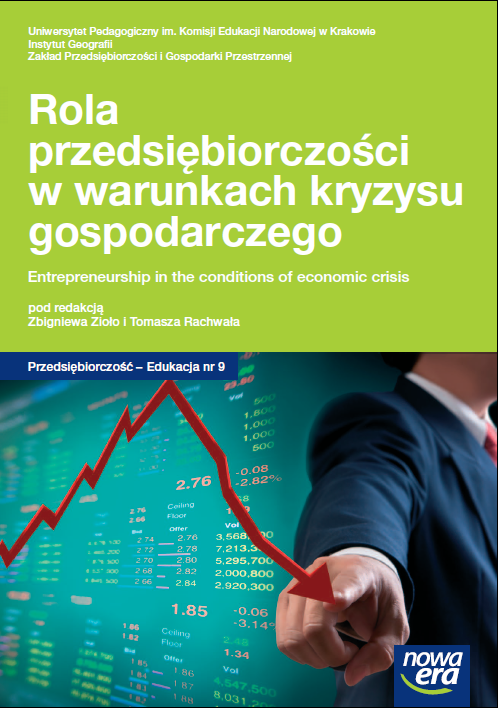Legal and administrative barriers to business in Poland in the light of the opinions of entrepreneurs and the ‘Doing Business’ reports
DOI:
https://doi.org/10.24917/20833296.9.3Keywords:
report, economic activity, tax system, review, tax barriersAbstract
One of the factors improving the competitiveness of factories and small business is, among others,legal security. This is represented by stability and cohesiveness of the tax system. Legislature mustensure that taxpayers are aware of their rights and duties, before tax is applicable. Entities coveredby the tax system must be certain that the stability of the tax law is protected, and that their interestsare secured as well. Hence, the result should take form of a basic principle of stability of law, which applies not only to tax regulations, but also to other legal areas. Law governing the powers and dutiesis primarily dependent on the changing political, social and economic situations. This article attemptsto identify the most important barriers, indicated by businessmen, and various institutions, including the World Bank. The article also contains a summary of ratings received by the Polish tax legislation system, provided by World Bank experts, and, perhaps more importantly, by Polish entrepreneurs.Annual reports of the World Bank, and the ‘Doing Business’ surveys present the situation of Polishentrepreneurs in the field of tax legislation and may serve as an excellent source for identifying weaknesses in the tax system and possibilities for its improvement. This study focuses in particularon the tax system, as the one which can positively or negatively affect the economy, and developmentof entrepreneurship.
References
Arent, A. (2007). Ocena wybranych warunków stosowania rozwiązań podatkowych dla przedsiębiorców. W: J. Głuchowski, A. Pomorska, J. Szołno-Koguc (red.), Podatkowe i niepodatkowe źródła finansowania zadań publicznych. Lublin: Wydawnictwo KUL.
Chądrzyński, M. (2007). Główne bariery rozwoju i funkcjonowania małych i średnich przedsiębiorstw na obszarach wiejskich województwa łódzkiego. Przedsiębiorczość – Edukacja, 3.
Kamińska, W. (2006). Wpływ procesów transformacji na rozwój małych firm prywatnych w Polsce. Przedsiębiorczość – Edukacja, 2.
Kosikowski, C. (2007). Podatki. Problem władzy i podatników. Warszawa: Wydawnictwo LexisNexis.
Kosek-Wojnar, M. (2012). Zasady podatkowe w teorii i praktyce. Warszawa: Wydawnictwo PWE Ostaszewski, J. (red.). (2010). Finanse. Warszawa: Wydawnictwo Difin.
Paying Taxes 2010. The globar picture, Bank Światowy & PricewatehuseCoopers 2010 (13 stycznia 2010). Pozyskano z: http://www.doingbusiness.org/.
Przedsiębiorczość w Polsce, Ministerstwo Gospodarki, Warszawa, Lipiec 2010.
Raport Banku Światowego Doing Business 2008–2011.
Raport 2012 – Warunki prowadzenia firm w Polsce, ZPP, Centrum im. A. Smitha, Warszawa 2011
Rosiński, R. (2008). Polski system podatkowy. Poszukiwanie optymalnych rozwiązań. Warszawa:Wydawnictwo Difin.
Starczewska-Krzysztoszek, M. (2008). Konkurencyjność sektora MŚP 2007. Raport z badań, PKPP Lewiatan, Warszawa
Szczodrowski, G. (2003). Polski system podatkowy. Strategia transformacji. Gdańsk: Wydawnictwo Uniwersytetu Gdańskiego.
Szołno-Koguc, J. (2000). Reforma polskiego systemu podatkowego 1990–1995: założenia a realizacja, Lublin: Wyd. UMCS.
Tomkiewicz, J. (2005). Polityka fiskalna a proces formowania się kapitału w gospodarkach posocjalistycznych. W: J. Tomkiewicz (red.), Finanse publiczne a wzrost gospodarczy. Warszawa: Wydawnictwo WSPiZ im. L. Koźmińskiego.
Zagórska, J. (2011). Bariery rozwoju małych i średnich przedsiębiorstw. Administracyjno-prawne aspekty prowadzenia działalności gospodarczej, PARP, Warszawa.
Downloads
Published
How to Cite
Issue
Section
License
Articles are published under the terms of the Creative Commons License (CC BY-ND 4.0; Attribution– NoDerivs).

